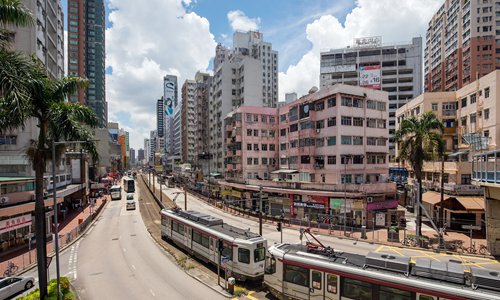
A view of Hong Kong. (Photo: VCG)
Major cities in the Guangdong-Hong Kong-Macao Greater Bay Area are being urged to break systemic barriers and seek external real estate supplies, industry insiders said, as nearly 35 million residents in the area have no apartments of their own.
Chinese property marketplace ke.com released a report on the status of the real estate market in the area on Friday. It showed that the home-ownership rate in eight of the 11 cities was below 60 percent, with that of Shenzhen, South China's Guangdong Province, standing at 23.7 percent, the lowest.
The average per capita living space in Hong Kong is 15 square meters, Shenzhen 19.7 square meters and Guangzhou 25 square meters, according to the report. That's far below the 2017 national average of 36.9 square meters.
To deal with the imbalance, Li Wenjie, senior vice president of ke.com, said that housing policies should be reformed and the relationship between the government and market should be redefined, domestic news site caijing.com.cn reported.
Currently, people without hukou (household registration) are required to make social security contributions or pay taxes in some cities in Guangdong Province for a certain number of years to be eligible to buy apartments.
This needs adjustment, the report said, adding that Hong Kong and Macao people should be encouraged to live in the Chinese mainland to boost integration between the two cities and the mainland.
Analysts said that there is still huge growth potential for the real estate market in the greater bay area.
According to ke.com, the value of property transactions in the area is expected to reach 3.7 trillion yuan ($523 billion) by 2025, accounting for 15 percent of the national total.
"The Greater Bay Area has a highly developed economy and a high per capita income, making it the most economically developed region in China. Therefore, there will be more demand for high-end real estate," Bai Ming, a research fellow at the Chinese Academy of International Trade and Economic Cooperation in Beijing, told the Global Times on Monday.
Yan Yuejin, research director at E-house China R&D Institute, told the Global Times that existing apartments should be fully utilized to boost property leasing, for example, apartments for experts and blue-collar workers.
The Ke.com report noted that the real estate market in the area is expected to maintain overall stability, without major price volatility. It also said that real estate finance centered on transactions and property management will see faster development.


